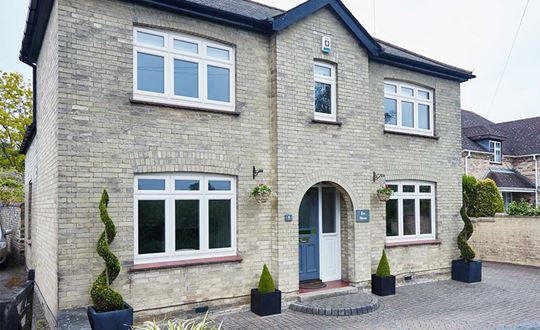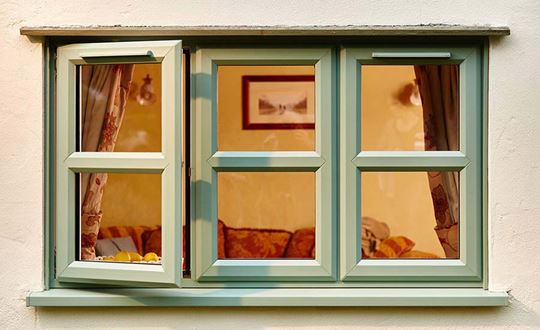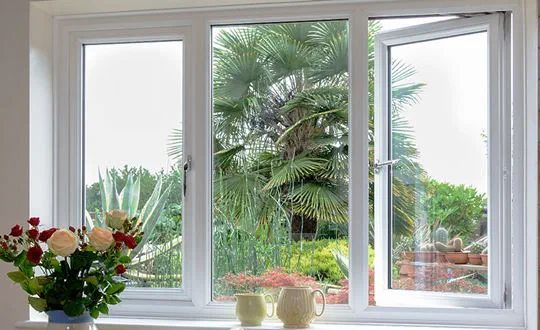How do you decide on which type of window glazing is best for your home? This guide helps you navigate the pros and cons of double and triple glazing, so you can make an informed choice.
Upgrading your windows to modern double glazing can improve the insulation of your home dramatically, particularly if you’re upgrading from single glazed or older double glazed windows. It improves the year-round comfort of your home and helps it become more energy-efficient. Double glazing also often comes with modern security features that keep your home and belongings safe. Overall, double glazed windows are a worthwhile investment.
Double glazing retains heat, reduces draughts and harvests the sun’s energy. New building regulations in England and Wales state that all new double glazed windows must achieve a BFRC rating of B or above. Before 2002 that was as low as an E, so upgrading could be even more worthwhile than you think.
Less heat escaping through your windows leads to a warmer house during the winter months. The warmer your home feels, the less reliant you are on your heating, so you use less energy and your bills are lower.
New double glazing is more secure than older double glazing and single glazed windows. Depending on the manufacturer, they have strong construction and locking mechanisms with their own guarantees.
One of the benefits of double glazing is that it can add value to your home, particularly if it increases your Energy Performance Certificate, or EPC. This is the system that scores the energy efficiency of your home and improving it could increase the value of your home by 14%.

If your home traps heat, your double glazing could stop heat getting out in a heatwave. Close your windows in the heat of the day to keep as much heat outside as possible, before opening them at night to let the cold air in.
You might be restricted to certain styles of double glazed windows, or even prohibited altogether in conservation areas and on listed buildings. In some cases it may not even be practical to remove an old window, even with permission. This is where secondary glazing can provide a solution. Always check with your local authority for any restrictions your home may fall under.
Depending on the manufacturer, material and size of your windows, double glazing can be as costly as it is affordable, particularly if you choose expensive material and style options.
If you’re looking for thermally efficient windows for your home, then triple glazing offers some of the biggest benefits. Upgrading your windows to triple glazing can improve the overall energy efficiency of your home, increase security and even add value.
The main benefit of triple glazing is that your home is warmer than with other glazing types. Three panes of glass and two gas-insulated spaces in between make it the best at preventing heat escaping your home through the windows.
Triple glazing is often the highest rated for energy efficiency, making it the most effective at helping you save money on energy bills.
Triple glazing can also help prevent outside noise travelling into your home when your windows are closed. This is especially useful if you live near a busy road or in a town or city centre.
The three panes of glass in triple glazing present a significant barrier, and the construction and locking mechanisms of most triple glazed windows makes them very difficult to break into.
Like double, triple glazing can increase the value of your home. New windows are a good way to refresh the outside, making it more attractive. By improving the energy efficiency of your home, you could also improve the EPC.

Because triple glazing is very good at harvesting the heat of the sun and retaining it, if your windows get a lot of sunlight, rooms with triple glazing would likely get too hot in the summer. Colder, shady rooms see the main benefit from triple glazing as the windows retain more heat than double.
Triple glazing often costs more than double glazing. That said, the long-term energy saving benefits will likely offset some of the short-term costs, but professional supply and install companies offer finance options to help spread the cost.
Triple is not always available in all materials or styles, and is sometimes not suitable for some homes, such as those in a conservation area or on a listed building.
Triple glazing thickness can vary depending on the manufacturer or style you choose. Anglian uPVC triple glazed windows are all 70mm deep front to back. This includes both the frame and the sealed unit, which is the glass and spacer bars.
Triple glazing vs. double glazing is a tricky comparison because choosing the right type of glazing for your home depends on what you need from your windows. Every home is different and it's important to assess your windows room by room. You're not limited to one type of glazing for your entire home either. It's just as easy to install various forms of Anglian glazing in different rooms because our double and triple-glazed windows use the same profile. When you choose Anglian for your home improvement project, we also send a surveyor to assess your home and help you decide which glazing is appropriate for your windows.
Whether triple or double glazing is better comes down to your home and what will work best for retaining heat and improving energy efficiency. Triple glazing is naturally more insulating thanks to its three layers of glass, but this can be too effective for south-facing windows or naturally warmer homes. Double glazing is often going to be the best option for modern, well-insulated homes that get natural sunlight throughout the year.
Triple glazing can be a better option for consistently colder rooms that get little or no natural sunshine, like north-facing rooms. The best solution can often be a mixture of both triple glazing and double glazing. This adds extra insulation for those naturally colder rooms, and less for the rooms that get warmed by the sun to keep them at a more comfortable temperature. This is more economical and energy-efficient in the long run.
The main difference between double and triple glazing is that triple glazing has three panes of glass separated by two sealed layers of insulating gas, while double glazing has two panes of glass and one insulating layer of gas. This gives them different energy efficiency ratings, with most triple glazed windows achieving a rating between B and A++ and double glazing achieving ratings between B and A+.
Another difference between double and triple glazing is that double is more versatile, in that it is available with all window materials and in every style. Triple glazing is typically only available with one or two materials and not in every style. For example, Anglian triple glazing is available in uPVC and only in Casement, Flush Casement and Tilt & Turn window styles.
While double and triple glazed units tend to have the same profile, they are sealed within their frames, so it is usually not possible to change the glazing once it is in a frame. To get the glazing out in the first place you would need to break or cut into the frame, compromising its effectiveness and security. When you want to replace your windows, Anglian send out a surveyor to assess your needs and our design team help you choose the perfect look.

Overall, triple glazing is worthwhile in British homes, but you should do your research. We have seen energy price fluctuations in recent years and British summers are getting hotter, and hot spells are lasting for longer periods of time.
Triple glazing is better than double when it comes to heat retention, which sounds great on paper. But it doesn’t sound so great during a three-week heatwave and you’ve replaced every window in your house with triple glazing. It is better to install double glazing in south-facing and west-facing rooms, which see more sunlight than north or east-facing rooms. To make triple glazing as effective and worthwhile as possible, mix and match the two so that you keep the colder rooms warmer in winter and the warmer rooms cooler in summer.
When you need new windows, it might not always be worth replacing your double glazed windows with triple. If you’re upgrading from old double glazing, there are obvious benefits. However, before you replace your windows, think about how old your windows are, what the climate is like where you live and where the windows are.
If you’re replacing double glazing that has been in place since before 2002, they could be as low as E-rated for energy efficiency. Before 2022 they might only be rated up to C, depending on the company you got them from. Since June 2022 Building Regulations changed so all new windows are B-rated as a minimum. Finding out the energy rating of your windows can be a good place to start when you want to calculate how much you could save by upgrading.
When it comes to making your home warmer in winter, triple glazing is one of the best options. However, the cost of replacing every window with A++ triple glazing might not be as worthwhile as A+-rated double glazing. In the long run you might save more on your energy bills and increase the value of your home, but how much greater will the saving be?
The Glass and Glazing Federation has created a calculator so you can see how much money new windows could save you on your bills every year. Below are two example scenarios of what you could see from replacing your old double glazing, one to A-rated double glazing and one to A++ rated triple glazing.

Every home is different when it comes to choosing double or triple glazed windows, with one or the other - or a combination of both - providing different solutions for your home.
The best approach is always to talk to the professionals, like Anglian, so we can help you find the ideal glazing for your home. We’ve been delivering the very best home improvements for over 55 years, so we know a thing or two about glazed windows. Our full service includes a free in-home or remote design visit, survey, installation and aftercare.
Get in touch with us today to talk about double or triple glazing for your home.
 Do new windows add value to your home?
Do new windows add value to your home?
New windows are certainly an investment, but is it one worth making? See how installing new windows can make your home more attractive to buyers and add lasting value to a property.
 Choosing the right window material & colour
Choosing the right window material & colour
Complete your windows with uPVC, wooden or aluminium frames, available in a wide range of colours and finishes. And if you simply can't choose, we're here to help you discover which designs will be most complementary to your home.
 How do double and triple glazed windows work?
How do double and triple glazed windows work?
Reducing energy bills, increasing security and insulating the home, double glazed windows are becoming essential for every homeowner. But how exactly do they do this? We're here to explain the science behind our energy-efficient windows.


